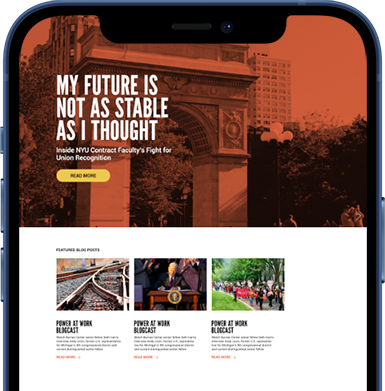In 1944, the Supreme Court interpreted the National Labor Relations Act --- our nation’s private-sector worker organizing and collective bargaining law --- to be broadly inclusive. Workers who might have been classified as “employees” or “independent contractors” using common-law tests could be covered by the statute:
Inequality of bargaining power in controversies over wages, hours and working conditions may as well characterize the status of the one group as of the other. The former, when acting alone, may be as ‘helpless in dealing with an employer,’ as ‘dependent . . . on his daily wage’ and as ‘unable to leave the employ and to resist arbitrary and unfair treatment’ as the latter. For each, ‘union . . . [may be] essential to give . . . opportunity to deal on equality with their employer.’ And for each, collective bargaining may be appropriate and effective for the ‘friendly adjustment of industrial disputes arising out of differences as to wages, hours, or other working conditions.’
Congress responded by legislatively overruling the Court’s decision in the Taft-Hartley Act and excluding common-law independent contractors from the Act’s coverage. Only workers whose relationships with a business fit the common-law definition of “employee” would be covered by the Act.
Seventy-six years later, the battle continues over which workers are covered by the Act and, therefore, protected when they seek to organize a union and bargain collectively with their employers. At some point during the next few weeks or months, the National Labor Relations Board will issue its decision in The Atlanta Opera Inc. The smart money is betting that the Biden-appointed Board majority will reverse a Trump-era precedent in Super Shuttle DFW, Inc. that meaningfully narrowed the definition of “employee.” In its place, the Board is expected to restore the rules established in an Obama-era precedent entitled FedEx Home Delivery.
The smart money may not be all that smart. The Board signaled its intention to make a substantial change to the law when it invited stakeholders beyond the parties in The Atlanta Opera Inc. to file amicus briefs debating the issues in the case. Nonetheless, this decision will be meaningful, and not only for the wig and makeup artists working for the Atlanta Opera who have already voted in their union representation election and would like to know the results. Re-drawing the porous line between coverage and no-coverage would include some unknown, but undoubtedly sizable, number of workers within the Act’s protections. The decision also would make it somewhat more difficult for employers to misclassify employees as independent contractors. For example, the Board’s decision in The Atlanta Opera Inc. will strengthen the conclusion reached by the Board’s Regional Director in June 2022 that port truck drivers working for XPO Logistics in Southern California are covered employees who can vote for union representation.
Yet, the Board’s decision is bound to leave many worker advocates unsatisfied. Because of the Taft-Hartley Act, the Board does not have the authority to replace the squishy and indeterminate common-law test of employment status with a clearer, simpler, and more broadly inclusive test, like the “ABC test” that is included in the recently reintroduced Protecting the Right to Organize (PRO) Act. The Board also does not have the authority to adopt President Biden’s proposal to extend collective bargaining rights to independent contractors who are similar in almost all ways to employees. Congress would have to act to make either legal change. Those changes will not happen with a thin Democratic majority in the U.S. Senate and an almost-as-thin Republican majority in the U.S. House of Representatives. Perhaps most frustrating, the decision in The Atlanta Opera Inc. may last only as long as the majority appointed by a Democratic president survives. Flip-flopping precedents has itself become a Board precedent.
The likeliest next chapter in the Board’s consideration of employment status under the Act will be written if General Counsel Jennifer Abruzzo finds a case she can prosecute before the Board that would establish the proposition that misclassifying employees as independent contractors is an unfair labor practice. On August 12, 2021, Abruzzo issued a memorandum directing her regional directors and other local agency leaders to find and prosecute priority cases. Included on her priority list was “[c]ases involving the applicability of Velox Express, Inc., 368 NLRB No. 61 (2019)(Board refusing to find a violation based on an employer having misclassified drivers as independent contractors).”
Because of the Act’s laughably weak remedies structure, the consequences for employers held liable for unfair labor practices are quite limited. Yet, establishing employee misclassification as an independent unfair labor practice will allow the Board to intervene before a union files a petition for a union representation election. It will extend anti-retaliation and anti-discirmination protections to more workers, which could mean more workers reinstated to their jobs with back pay if they are fired during a union organizing effort. Along with the Board’s forthcoming decision in The Atlanta Opera, Inc., it has the potential to take the all-too-effective weapon of employee misclassification out of the hands of employers seeking to avoid a union organizing effort.
By any reasonable definition, that’s a step forward for workers and worker power.

